An Analysis of Sustainable Tourism Development in Qatar: A Report
VerifiedAdded on 2020/11/12
|11
|3389
|338
Report
AI Summary
This report, prepared for International Tourism Consultancy, provides a comprehensive analysis of sustainable tourism development with a specific focus on Qatar. It begins with an introduction to sustainable tourism and its importance, followed by an examination of tourism development planning at various levels, including international, national, regional, and sub-regional. The report evaluates the significance of interactive planning systems and processes, emphasizing their role in successful event management and risk assessment. It then explores different methods for measuring tourist impact, such as economic, environmental, and social impact models. The report also addresses conflict resolution strategies for tourism development, considering social beliefs, stakeholder differences, and government policies. Furthermore, it delves into the implications of balancing supply and demand in Qatar's tourism sector, along with the ethical issues associated with enclave tourism. The report concludes by discussing current issues in tourism development in developing countries and emerging destinations, offering recommendations for sustainable practices.
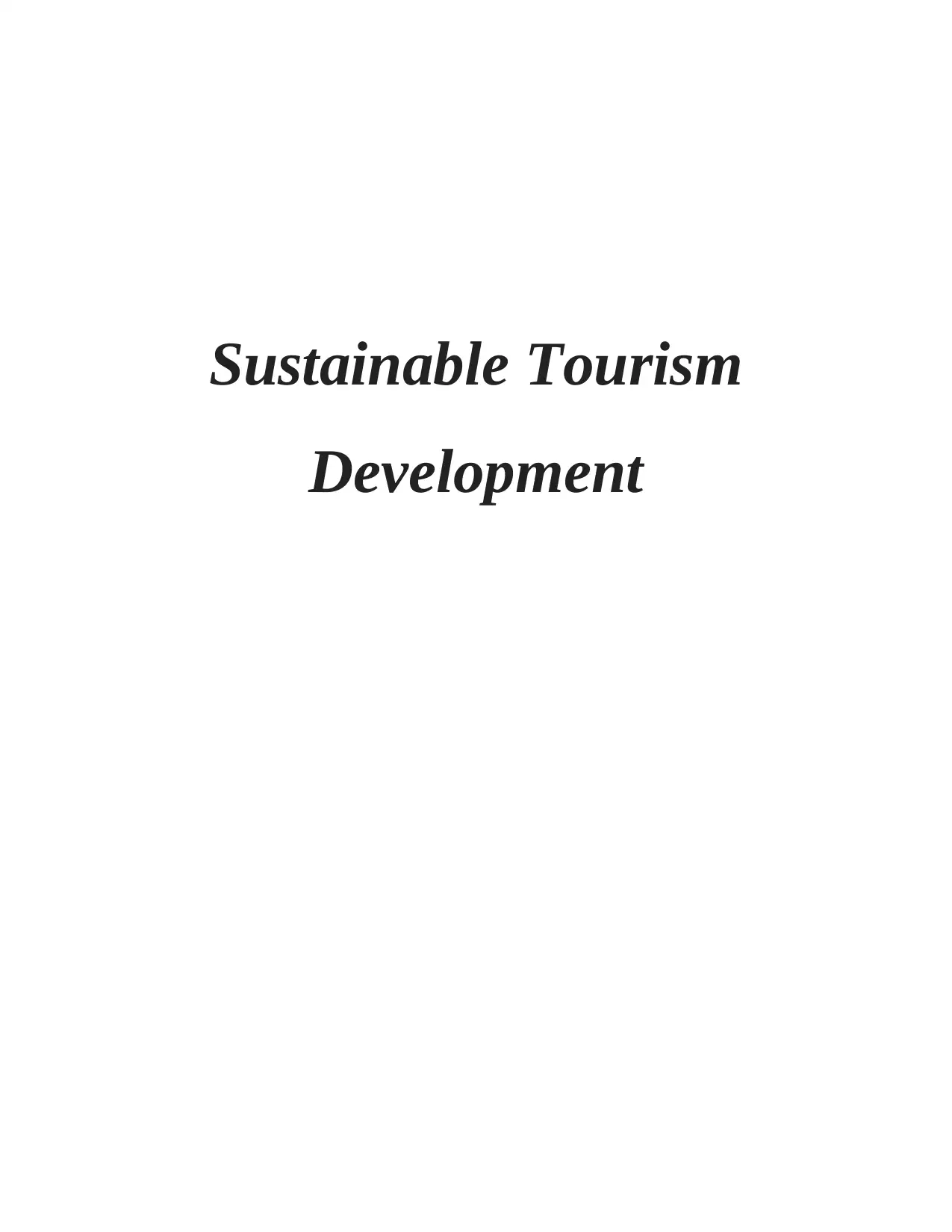
Sustainable Tourism
Development
Development
Paraphrase This Document
Need a fresh take? Get an instant paraphrase of this document with our AI Paraphraser
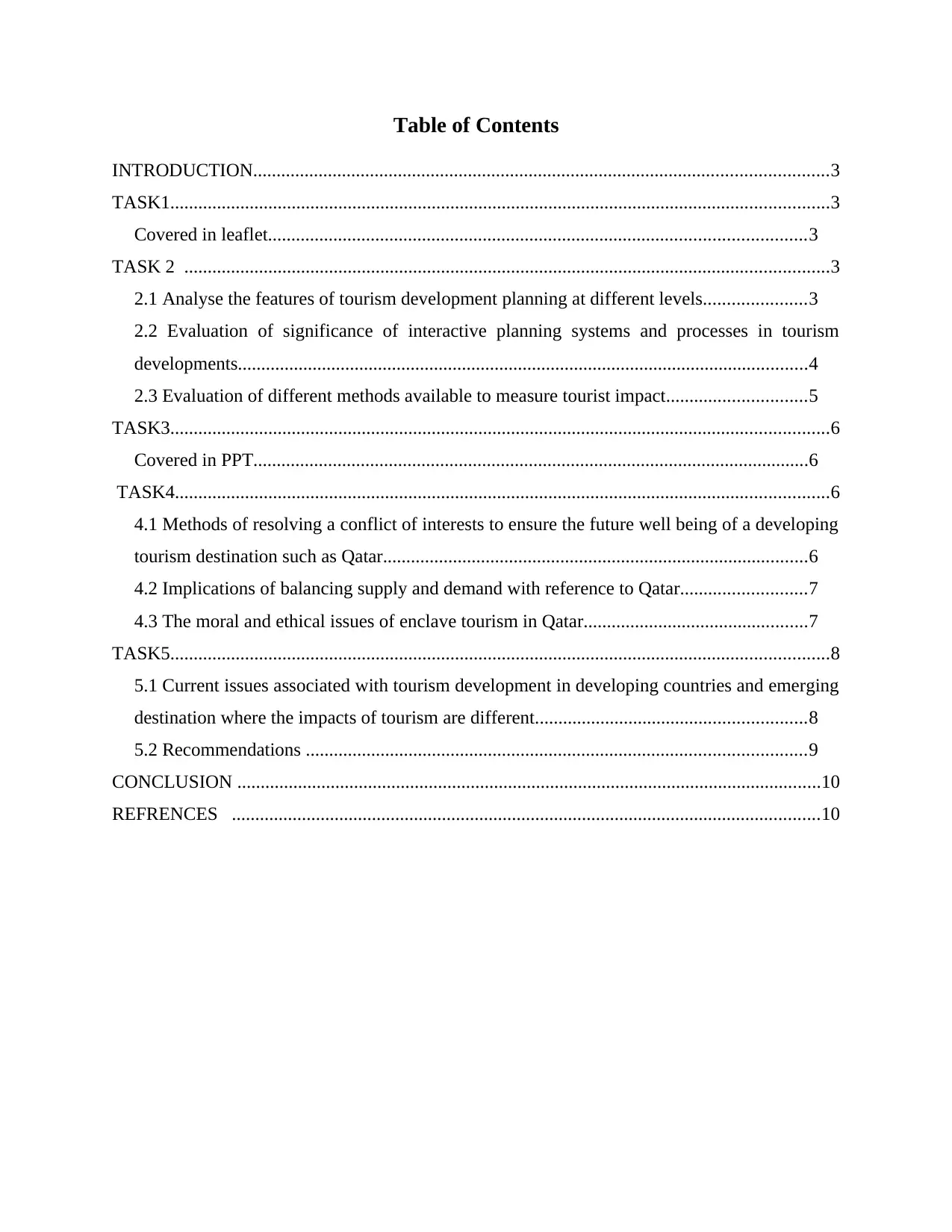
Table of Contents
INTRODUCTION...........................................................................................................................3
TASK1.............................................................................................................................................3
Covered in leaflet...................................................................................................................3
TASK 2 ..........................................................................................................................................3
2.1 Analyse the features of tourism development planning at different levels......................3
2.2 Evaluation of significance of interactive planning systems and processes in tourism
developments..........................................................................................................................4
2.3 Evaluation of different methods available to measure tourist impact..............................5
TASK3.............................................................................................................................................6
Covered in PPT.......................................................................................................................6
TASK4............................................................................................................................................6
4.1 Methods of resolving a conflict of interests to ensure the future well being of a developing
tourism destination such as Qatar...........................................................................................6
4.2 Implications of balancing supply and demand with reference to Qatar...........................7
4.3 The moral and ethical issues of enclave tourism in Qatar................................................7
TASK5.............................................................................................................................................8
5.1 Current issues associated with tourism development in developing countries and emerging
destination where the impacts of tourism are different..........................................................8
5.2 Recommendations ...........................................................................................................9
CONCLUSION .............................................................................................................................10
REFRENCES ..............................................................................................................................10
INTRODUCTION...........................................................................................................................3
TASK1.............................................................................................................................................3
Covered in leaflet...................................................................................................................3
TASK 2 ..........................................................................................................................................3
2.1 Analyse the features of tourism development planning at different levels......................3
2.2 Evaluation of significance of interactive planning systems and processes in tourism
developments..........................................................................................................................4
2.3 Evaluation of different methods available to measure tourist impact..............................5
TASK3.............................................................................................................................................6
Covered in PPT.......................................................................................................................6
TASK4............................................................................................................................................6
4.1 Methods of resolving a conflict of interests to ensure the future well being of a developing
tourism destination such as Qatar...........................................................................................6
4.2 Implications of balancing supply and demand with reference to Qatar...........................7
4.3 The moral and ethical issues of enclave tourism in Qatar................................................7
TASK5.............................................................................................................................................8
5.1 Current issues associated with tourism development in developing countries and emerging
destination where the impacts of tourism are different..........................................................8
5.2 Recommendations ...........................................................................................................9
CONCLUSION .............................................................................................................................10
REFRENCES ..............................................................................................................................10
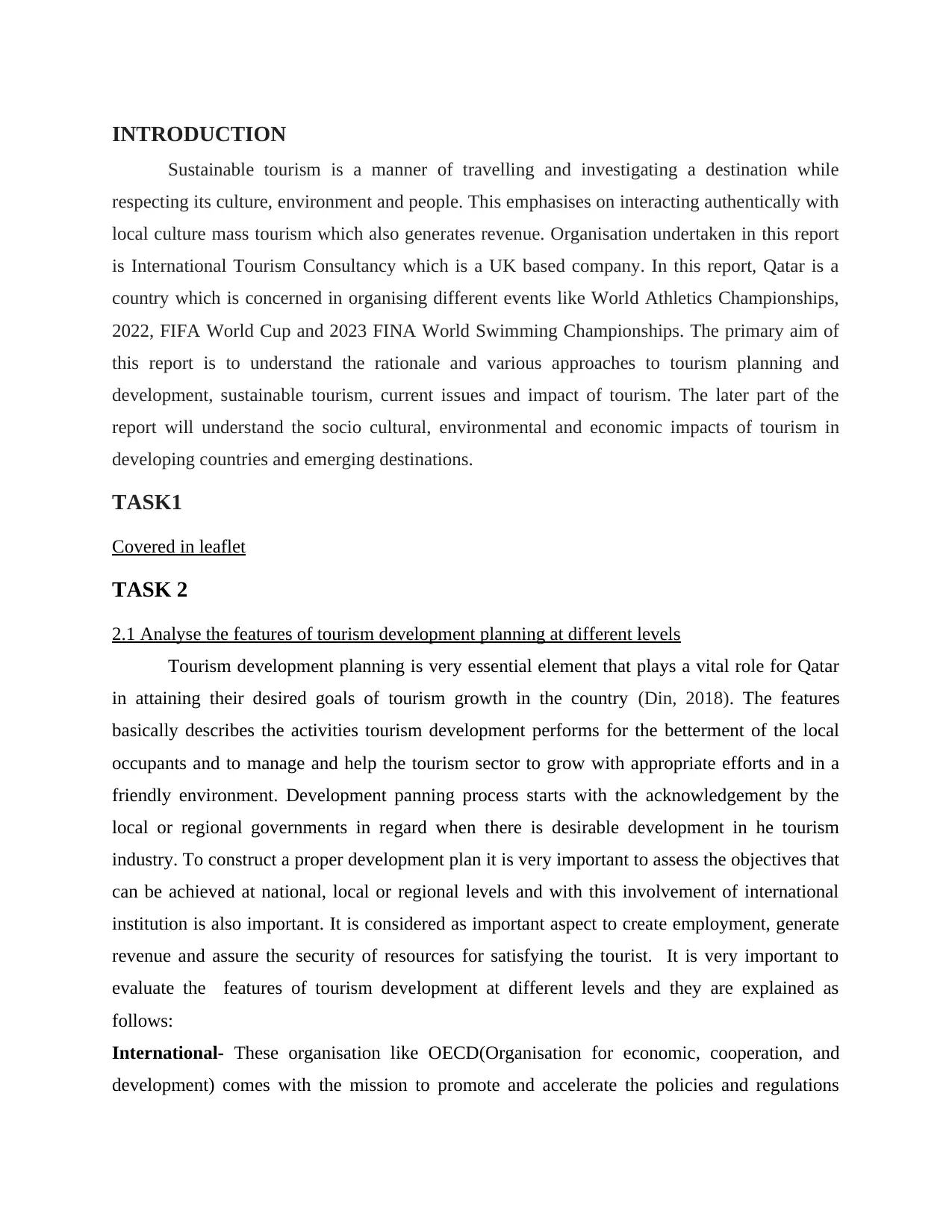
INTRODUCTION
Sustainable tourism is a manner of travelling and investigating a destination while
respecting its culture, environment and people. This emphasises on interacting authentically with
local culture mass tourism which also generates revenue. Organisation undertaken in this report
is International Tourism Consultancy which is a UK based company. In this report, Qatar is a
country which is concerned in organising different events like World Athletics Championships,
2022, FIFA World Cup and 2023 FINA World Swimming Championships. The primary aim of
this report is to understand the rationale and various approaches to tourism planning and
development, sustainable tourism, current issues and impact of tourism. The later part of the
report will understand the socio cultural, environmental and economic impacts of tourism in
developing countries and emerging destinations.
TASK1
Covered in leaflet
TASK 2
2.1 Analyse the features of tourism development planning at different levels
Tourism development planning is very essential element that plays a vital role for Qatar
in attaining their desired goals of tourism growth in the country (Din, 2018). The features
basically describes the activities tourism development performs for the betterment of the local
occupants and to manage and help the tourism sector to grow with appropriate efforts and in a
friendly environment. Development panning process starts with the acknowledgement by the
local or regional governments in regard when there is desirable development in he tourism
industry. To construct a proper development plan it is very important to assess the objectives that
can be achieved at national, local or regional levels and with this involvement of international
institution is also important. It is considered as important aspect to create employment, generate
revenue and assure the security of resources for satisfying the tourist. It is very important to
evaluate the features of tourism development at different levels and they are explained as
follows:
International- These organisation like OECD(Organisation for economic, cooperation, and
development) comes with the mission to promote and accelerate the policies and regulations
Sustainable tourism is a manner of travelling and investigating a destination while
respecting its culture, environment and people. This emphasises on interacting authentically with
local culture mass tourism which also generates revenue. Organisation undertaken in this report
is International Tourism Consultancy which is a UK based company. In this report, Qatar is a
country which is concerned in organising different events like World Athletics Championships,
2022, FIFA World Cup and 2023 FINA World Swimming Championships. The primary aim of
this report is to understand the rationale and various approaches to tourism planning and
development, sustainable tourism, current issues and impact of tourism. The later part of the
report will understand the socio cultural, environmental and economic impacts of tourism in
developing countries and emerging destinations.
TASK1
Covered in leaflet
TASK 2
2.1 Analyse the features of tourism development planning at different levels
Tourism development planning is very essential element that plays a vital role for Qatar
in attaining their desired goals of tourism growth in the country (Din, 2018). The features
basically describes the activities tourism development performs for the betterment of the local
occupants and to manage and help the tourism sector to grow with appropriate efforts and in a
friendly environment. Development panning process starts with the acknowledgement by the
local or regional governments in regard when there is desirable development in he tourism
industry. To construct a proper development plan it is very important to assess the objectives that
can be achieved at national, local or regional levels and with this involvement of international
institution is also important. It is considered as important aspect to create employment, generate
revenue and assure the security of resources for satisfying the tourist. It is very important to
evaluate the features of tourism development at different levels and they are explained as
follows:
International- These organisation like OECD(Organisation for economic, cooperation, and
development) comes with the mission to promote and accelerate the policies and regulations
⊘ This is a preview!⊘
Do you want full access?
Subscribe today to unlock all pages.

Trusted by 1+ million students worldwide
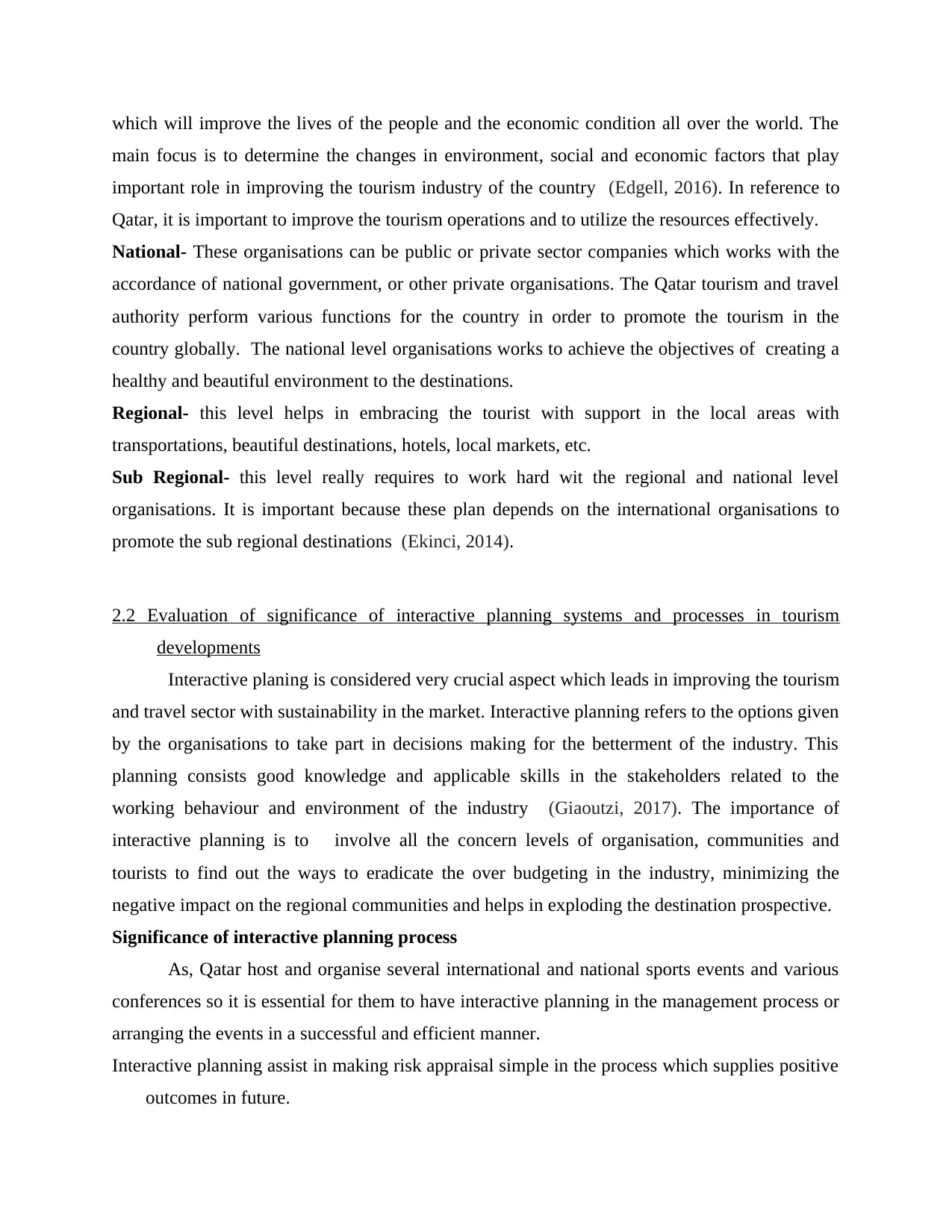
which will improve the lives of the people and the economic condition all over the world. The
main focus is to determine the changes in environment, social and economic factors that play
important role in improving the tourism industry of the country (Edgell, 2016). In reference to
Qatar, it is important to improve the tourism operations and to utilize the resources effectively.
National- These organisations can be public or private sector companies which works with the
accordance of national government, or other private organisations. The Qatar tourism and travel
authority perform various functions for the country in order to promote the tourism in the
country globally. The national level organisations works to achieve the objectives of creating a
healthy and beautiful environment to the destinations.
Regional- this level helps in embracing the tourist with support in the local areas with
transportations, beautiful destinations, hotels, local markets, etc.
Sub Regional- this level really requires to work hard wit the regional and national level
organisations. It is important because these plan depends on the international organisations to
promote the sub regional destinations (Ekinci, 2014).
2.2 Evaluation of significance of interactive planning systems and processes in tourism
developments
Interactive planing is considered very crucial aspect which leads in improving the tourism
and travel sector with sustainability in the market. Interactive planning refers to the options given
by the organisations to take part in decisions making for the betterment of the industry. This
planning consists good knowledge and applicable skills in the stakeholders related to the
working behaviour and environment of the industry (Giaoutzi, 2017). The importance of
interactive planning is to involve all the concern levels of organisation, communities and
tourists to find out the ways to eradicate the over budgeting in the industry, minimizing the
negative impact on the regional communities and helps in exploding the destination prospective.
Significance of interactive planning process
As, Qatar host and organise several international and national sports events and various
conferences so it is essential for them to have interactive planning in the management process or
arranging the events in a successful and efficient manner.
Interactive planning assist in making risk appraisal simple in the process which supplies positive
outcomes in future.
main focus is to determine the changes in environment, social and economic factors that play
important role in improving the tourism industry of the country (Edgell, 2016). In reference to
Qatar, it is important to improve the tourism operations and to utilize the resources effectively.
National- These organisations can be public or private sector companies which works with the
accordance of national government, or other private organisations. The Qatar tourism and travel
authority perform various functions for the country in order to promote the tourism in the
country globally. The national level organisations works to achieve the objectives of creating a
healthy and beautiful environment to the destinations.
Regional- this level helps in embracing the tourist with support in the local areas with
transportations, beautiful destinations, hotels, local markets, etc.
Sub Regional- this level really requires to work hard wit the regional and national level
organisations. It is important because these plan depends on the international organisations to
promote the sub regional destinations (Ekinci, 2014).
2.2 Evaluation of significance of interactive planning systems and processes in tourism
developments
Interactive planing is considered very crucial aspect which leads in improving the tourism
and travel sector with sustainability in the market. Interactive planning refers to the options given
by the organisations to take part in decisions making for the betterment of the industry. This
planning consists good knowledge and applicable skills in the stakeholders related to the
working behaviour and environment of the industry (Giaoutzi, 2017). The importance of
interactive planning is to involve all the concern levels of organisation, communities and
tourists to find out the ways to eradicate the over budgeting in the industry, minimizing the
negative impact on the regional communities and helps in exploding the destination prospective.
Significance of interactive planning process
As, Qatar host and organise several international and national sports events and various
conferences so it is essential for them to have interactive planning in the management process or
arranging the events in a successful and efficient manner.
Interactive planning assist in making risk appraisal simple in the process which supplies positive
outcomes in future.
Paraphrase This Document
Need a fresh take? Get an instant paraphrase of this document with our AI Paraphraser
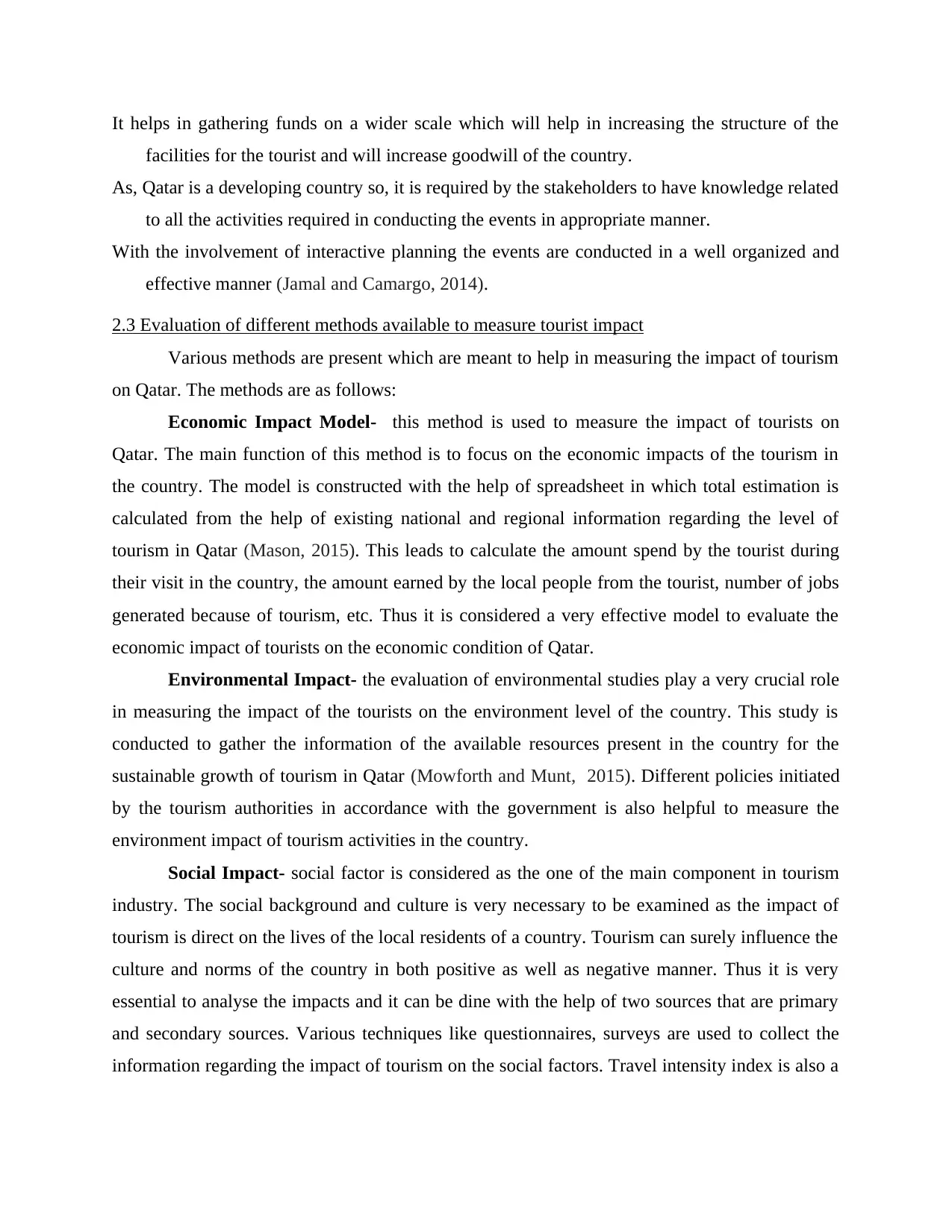
It helps in gathering funds on a wider scale which will help in increasing the structure of the
facilities for the tourist and will increase goodwill of the country.
As, Qatar is a developing country so, it is required by the stakeholders to have knowledge related
to all the activities required in conducting the events in appropriate manner.
With the involvement of interactive planning the events are conducted in a well organized and
effective manner (Jamal and Camargo, 2014).
2.3 Evaluation of different methods available to measure tourist impact
Various methods are present which are meant to help in measuring the impact of tourism
on Qatar. The methods are as follows:
Economic Impact Model- this method is used to measure the impact of tourists on
Qatar. The main function of this method is to focus on the economic impacts of the tourism in
the country. The model is constructed with the help of spreadsheet in which total estimation is
calculated from the help of existing national and regional information regarding the level of
tourism in Qatar (Mason, 2015). This leads to calculate the amount spend by the tourist during
their visit in the country, the amount earned by the local people from the tourist, number of jobs
generated because of tourism, etc. Thus it is considered a very effective model to evaluate the
economic impact of tourists on the economic condition of Qatar.
Environmental Impact- the evaluation of environmental studies play a very crucial role
in measuring the impact of the tourists on the environment level of the country. This study is
conducted to gather the information of the available resources present in the country for the
sustainable growth of tourism in Qatar (Mowforth and Munt, 2015). Different policies initiated
by the tourism authorities in accordance with the government is also helpful to measure the
environment impact of tourism activities in the country.
Social Impact- social factor is considered as the one of the main component in tourism
industry. The social background and culture is very necessary to be examined as the impact of
tourism is direct on the lives of the local residents of a country. Tourism can surely influence the
culture and norms of the country in both positive as well as negative manner. Thus it is very
essential to analyse the impacts and it can be dine with the help of two sources that are primary
and secondary sources. Various techniques like questionnaires, surveys are used to collect the
information regarding the impact of tourism on the social factors. Travel intensity index is also a
facilities for the tourist and will increase goodwill of the country.
As, Qatar is a developing country so, it is required by the stakeholders to have knowledge related
to all the activities required in conducting the events in appropriate manner.
With the involvement of interactive planning the events are conducted in a well organized and
effective manner (Jamal and Camargo, 2014).
2.3 Evaluation of different methods available to measure tourist impact
Various methods are present which are meant to help in measuring the impact of tourism
on Qatar. The methods are as follows:
Economic Impact Model- this method is used to measure the impact of tourists on
Qatar. The main function of this method is to focus on the economic impacts of the tourism in
the country. The model is constructed with the help of spreadsheet in which total estimation is
calculated from the help of existing national and regional information regarding the level of
tourism in Qatar (Mason, 2015). This leads to calculate the amount spend by the tourist during
their visit in the country, the amount earned by the local people from the tourist, number of jobs
generated because of tourism, etc. Thus it is considered a very effective model to evaluate the
economic impact of tourists on the economic condition of Qatar.
Environmental Impact- the evaluation of environmental studies play a very crucial role
in measuring the impact of the tourists on the environment level of the country. This study is
conducted to gather the information of the available resources present in the country for the
sustainable growth of tourism in Qatar (Mowforth and Munt, 2015). Different policies initiated
by the tourism authorities in accordance with the government is also helpful to measure the
environment impact of tourism activities in the country.
Social Impact- social factor is considered as the one of the main component in tourism
industry. The social background and culture is very necessary to be examined as the impact of
tourism is direct on the lives of the local residents of a country. Tourism can surely influence the
culture and norms of the country in both positive as well as negative manner. Thus it is very
essential to analyse the impacts and it can be dine with the help of two sources that are primary
and secondary sources. Various techniques like questionnaires, surveys are used to collect the
information regarding the impact of tourism on the social factors. Travel intensity index is also a
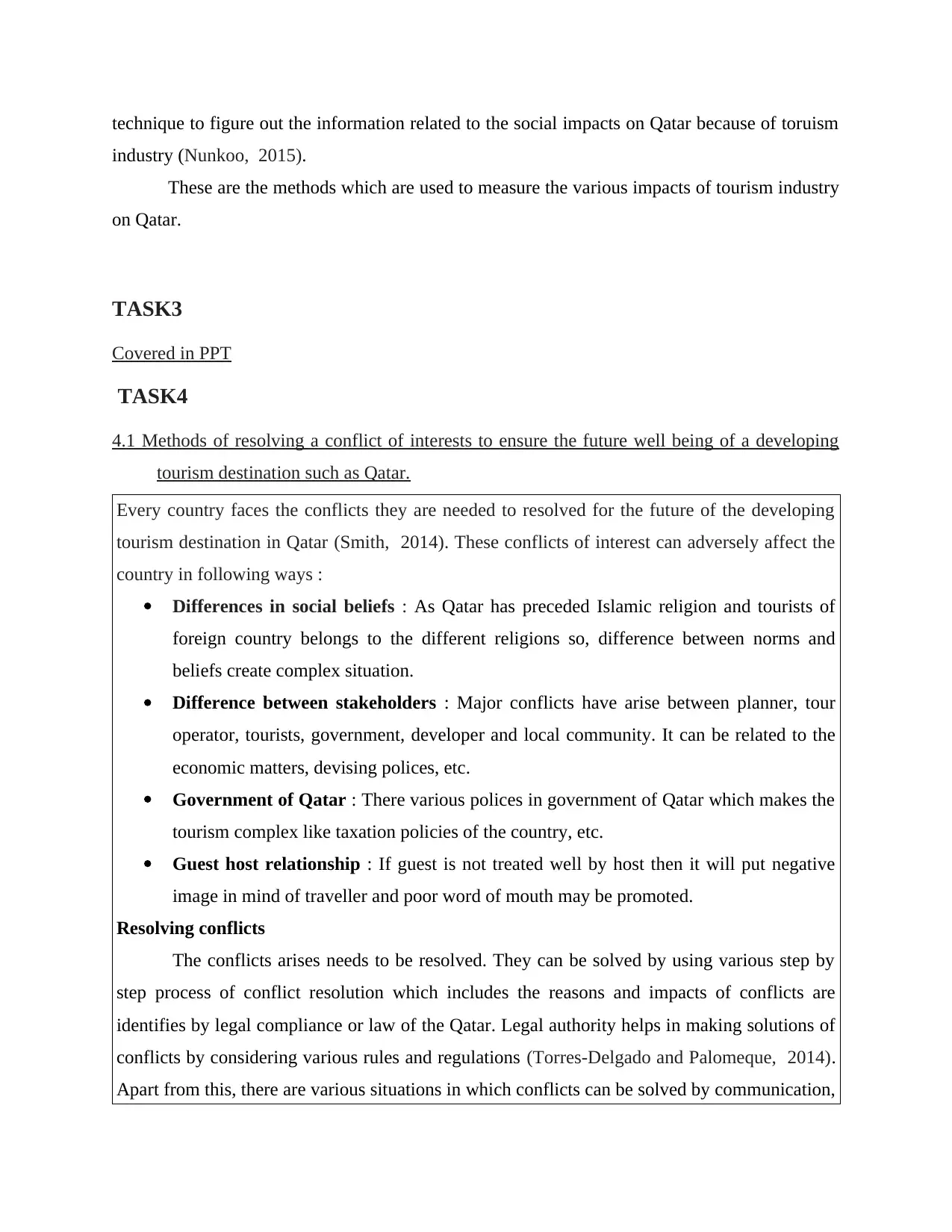
technique to figure out the information related to the social impacts on Qatar because of toruism
industry (Nunkoo, 2015).
These are the methods which are used to measure the various impacts of tourism industry
on Qatar.
TASK3
Covered in PPT
TASK4
4.1 Methods of resolving a conflict of interests to ensure the future well being of a developing
tourism destination such as Qatar.
Every country faces the conflicts they are needed to resolved for the future of the developing
tourism destination in Qatar (Smith, 2014). These conflicts of interest can adversely affect the
country in following ways :
Differences in social beliefs : As Qatar has preceded Islamic religion and tourists of
foreign country belongs to the different religions so, difference between norms and
beliefs create complex situation.
Difference between stakeholders : Major conflicts have arise between planner, tour
operator, tourists, government, developer and local community. It can be related to the
economic matters, devising polices, etc.
Government of Qatar : There various polices in government of Qatar which makes the
tourism complex like taxation policies of the country, etc.
Guest host relationship : If guest is not treated well by host then it will put negative
image in mind of traveller and poor word of mouth may be promoted.
Resolving conflicts
The conflicts arises needs to be resolved. They can be solved by using various step by
step process of conflict resolution which includes the reasons and impacts of conflicts are
identifies by legal compliance or law of the Qatar. Legal authority helps in making solutions of
conflicts by considering various rules and regulations (Torres-Delgado and Palomeque, 2014).
Apart from this, there are various situations in which conflicts can be solved by communication,
industry (Nunkoo, 2015).
These are the methods which are used to measure the various impacts of tourism industry
on Qatar.
TASK3
Covered in PPT
TASK4
4.1 Methods of resolving a conflict of interests to ensure the future well being of a developing
tourism destination such as Qatar.
Every country faces the conflicts they are needed to resolved for the future of the developing
tourism destination in Qatar (Smith, 2014). These conflicts of interest can adversely affect the
country in following ways :
Differences in social beliefs : As Qatar has preceded Islamic religion and tourists of
foreign country belongs to the different religions so, difference between norms and
beliefs create complex situation.
Difference between stakeholders : Major conflicts have arise between planner, tour
operator, tourists, government, developer and local community. It can be related to the
economic matters, devising polices, etc.
Government of Qatar : There various polices in government of Qatar which makes the
tourism complex like taxation policies of the country, etc.
Guest host relationship : If guest is not treated well by host then it will put negative
image in mind of traveller and poor word of mouth may be promoted.
Resolving conflicts
The conflicts arises needs to be resolved. They can be solved by using various step by
step process of conflict resolution which includes the reasons and impacts of conflicts are
identifies by legal compliance or law of the Qatar. Legal authority helps in making solutions of
conflicts by considering various rules and regulations (Torres-Delgado and Palomeque, 2014).
Apart from this, there are various situations in which conflicts can be solved by communication,
⊘ This is a preview!⊘
Do you want full access?
Subscribe today to unlock all pages.

Trusted by 1+ million students worldwide
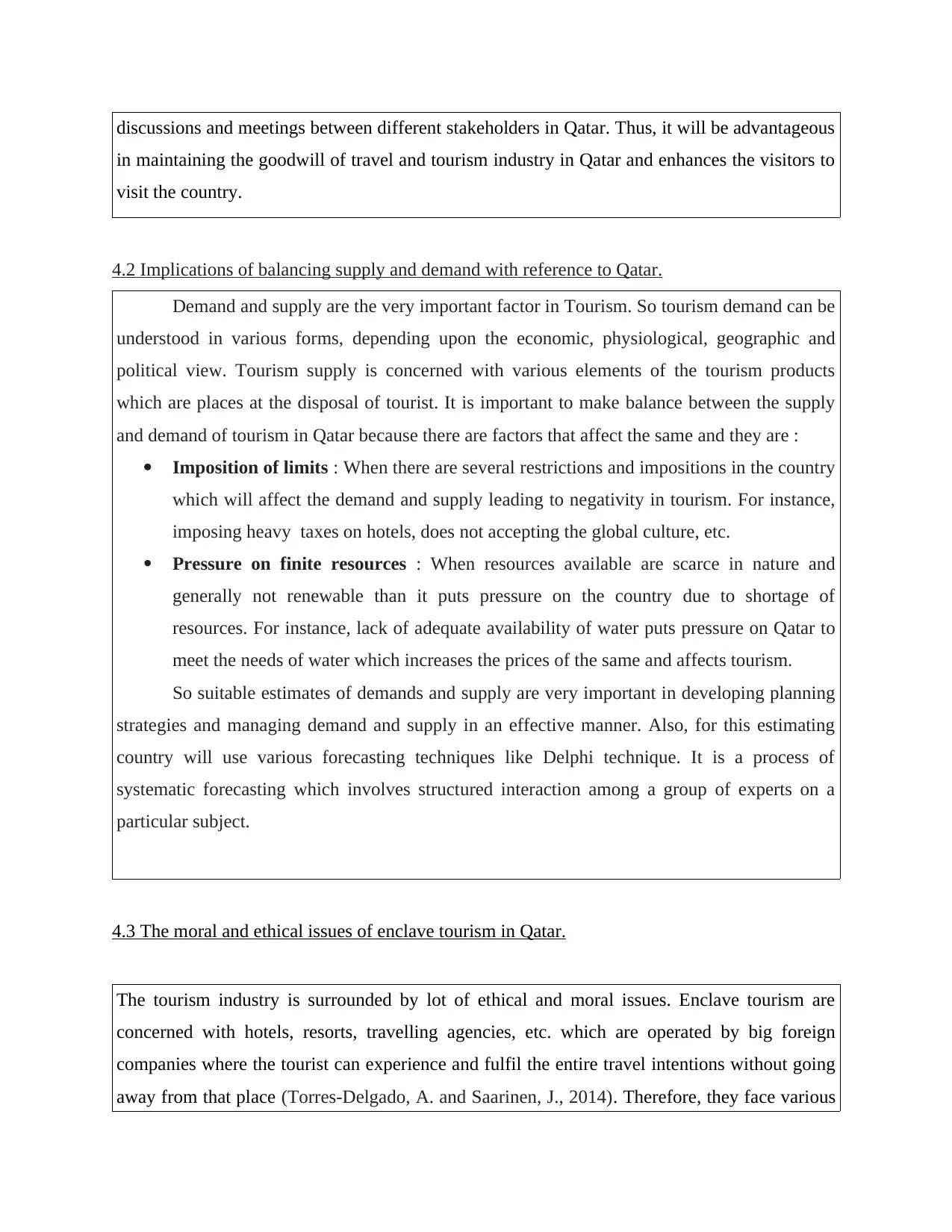
discussions and meetings between different stakeholders in Qatar. Thus, it will be advantageous
in maintaining the goodwill of travel and tourism industry in Qatar and enhances the visitors to
visit the country.
4.2 Implications of balancing supply and demand with reference to Qatar.
Demand and supply are the very important factor in Tourism. So tourism demand can be
understood in various forms, depending upon the economic, physiological, geographic and
political view. Tourism supply is concerned with various elements of the tourism products
which are places at the disposal of tourist. It is important to make balance between the supply
and demand of tourism in Qatar because there are factors that affect the same and they are :
Imposition of limits : When there are several restrictions and impositions in the country
which will affect the demand and supply leading to negativity in tourism. For instance,
imposing heavy taxes on hotels, does not accepting the global culture, etc.
Pressure on finite resources : When resources available are scarce in nature and
generally not renewable than it puts pressure on the country due to shortage of
resources. For instance, lack of adequate availability of water puts pressure on Qatar to
meet the needs of water which increases the prices of the same and affects tourism.
So suitable estimates of demands and supply are very important in developing planning
strategies and managing demand and supply in an effective manner. Also, for this estimating
country will use various forecasting techniques like Delphi technique. It is a process of
systematic forecasting which involves structured interaction among a group of experts on a
particular subject.
4.3 The moral and ethical issues of enclave tourism in Qatar.
The tourism industry is surrounded by lot of ethical and moral issues. Enclave tourism are
concerned with hotels, resorts, travelling agencies, etc. which are operated by big foreign
companies where the tourist can experience and fulfil the entire travel intentions without going
away from that place (Torres-Delgado, A. and Saarinen, J., 2014). Therefore, they face various
in maintaining the goodwill of travel and tourism industry in Qatar and enhances the visitors to
visit the country.
4.2 Implications of balancing supply and demand with reference to Qatar.
Demand and supply are the very important factor in Tourism. So tourism demand can be
understood in various forms, depending upon the economic, physiological, geographic and
political view. Tourism supply is concerned with various elements of the tourism products
which are places at the disposal of tourist. It is important to make balance between the supply
and demand of tourism in Qatar because there are factors that affect the same and they are :
Imposition of limits : When there are several restrictions and impositions in the country
which will affect the demand and supply leading to negativity in tourism. For instance,
imposing heavy taxes on hotels, does not accepting the global culture, etc.
Pressure on finite resources : When resources available are scarce in nature and
generally not renewable than it puts pressure on the country due to shortage of
resources. For instance, lack of adequate availability of water puts pressure on Qatar to
meet the needs of water which increases the prices of the same and affects tourism.
So suitable estimates of demands and supply are very important in developing planning
strategies and managing demand and supply in an effective manner. Also, for this estimating
country will use various forecasting techniques like Delphi technique. It is a process of
systematic forecasting which involves structured interaction among a group of experts on a
particular subject.
4.3 The moral and ethical issues of enclave tourism in Qatar.
The tourism industry is surrounded by lot of ethical and moral issues. Enclave tourism are
concerned with hotels, resorts, travelling agencies, etc. which are operated by big foreign
companies where the tourist can experience and fulfil the entire travel intentions without going
away from that place (Torres-Delgado, A. and Saarinen, J., 2014). Therefore, they face various
Paraphrase This Document
Need a fresh take? Get an instant paraphrase of this document with our AI Paraphraser
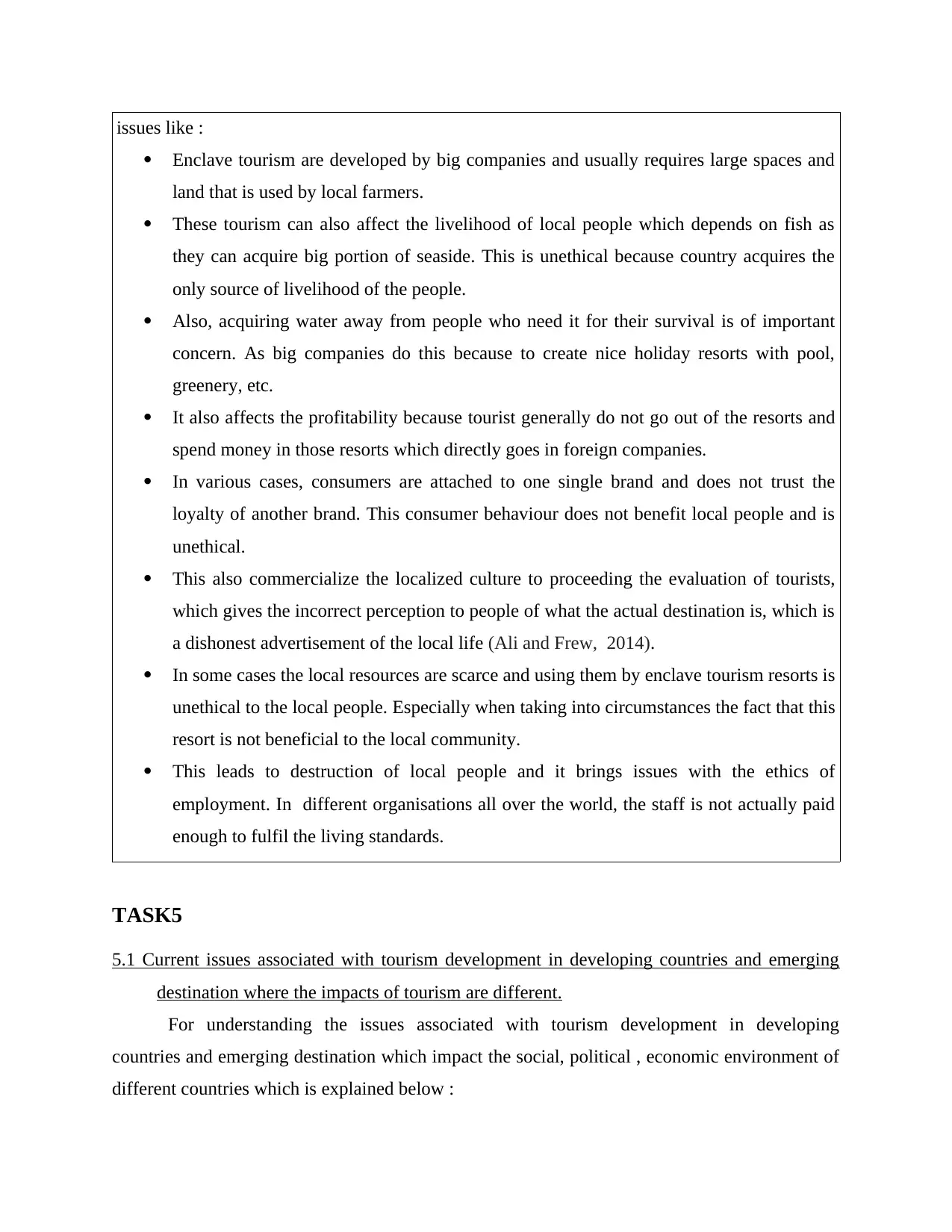
issues like :
Enclave tourism are developed by big companies and usually requires large spaces and
land that is used by local farmers.
These tourism can also affect the livelihood of local people which depends on fish as
they can acquire big portion of seaside. This is unethical because country acquires the
only source of livelihood of the people.
Also, acquiring water away from people who need it for their survival is of important
concern. As big companies do this because to create nice holiday resorts with pool,
greenery, etc.
It also affects the profitability because tourist generally do not go out of the resorts and
spend money in those resorts which directly goes in foreign companies.
In various cases, consumers are attached to one single brand and does not trust the
loyalty of another brand. This consumer behaviour does not benefit local people and is
unethical.
This also commercialize the localized culture to proceeding the evaluation of tourists,
which gives the incorrect perception to people of what the actual destination is, which is
a dishonest advertisement of the local life (Ali and Frew, 2014).
In some cases the local resources are scarce and using them by enclave tourism resorts is
unethical to the local people. Especially when taking into circumstances the fact that this
resort is not beneficial to the local community.
This leads to destruction of local people and it brings issues with the ethics of
employment. In different organisations all over the world, the staff is not actually paid
enough to fulfil the living standards.
TASK5
5.1 Current issues associated with tourism development in developing countries and emerging
destination where the impacts of tourism are different.
For understanding the issues associated with tourism development in developing
countries and emerging destination which impact the social, political , economic environment of
different countries which is explained below :
Enclave tourism are developed by big companies and usually requires large spaces and
land that is used by local farmers.
These tourism can also affect the livelihood of local people which depends on fish as
they can acquire big portion of seaside. This is unethical because country acquires the
only source of livelihood of the people.
Also, acquiring water away from people who need it for their survival is of important
concern. As big companies do this because to create nice holiday resorts with pool,
greenery, etc.
It also affects the profitability because tourist generally do not go out of the resorts and
spend money in those resorts which directly goes in foreign companies.
In various cases, consumers are attached to one single brand and does not trust the
loyalty of another brand. This consumer behaviour does not benefit local people and is
unethical.
This also commercialize the localized culture to proceeding the evaluation of tourists,
which gives the incorrect perception to people of what the actual destination is, which is
a dishonest advertisement of the local life (Ali and Frew, 2014).
In some cases the local resources are scarce and using them by enclave tourism resorts is
unethical to the local people. Especially when taking into circumstances the fact that this
resort is not beneficial to the local community.
This leads to destruction of local people and it brings issues with the ethics of
employment. In different organisations all over the world, the staff is not actually paid
enough to fulfil the living standards.
TASK5
5.1 Current issues associated with tourism development in developing countries and emerging
destination where the impacts of tourism are different.
For understanding the issues associated with tourism development in developing
countries and emerging destination which impact the social, political , economic environment of
different countries which is explained below :
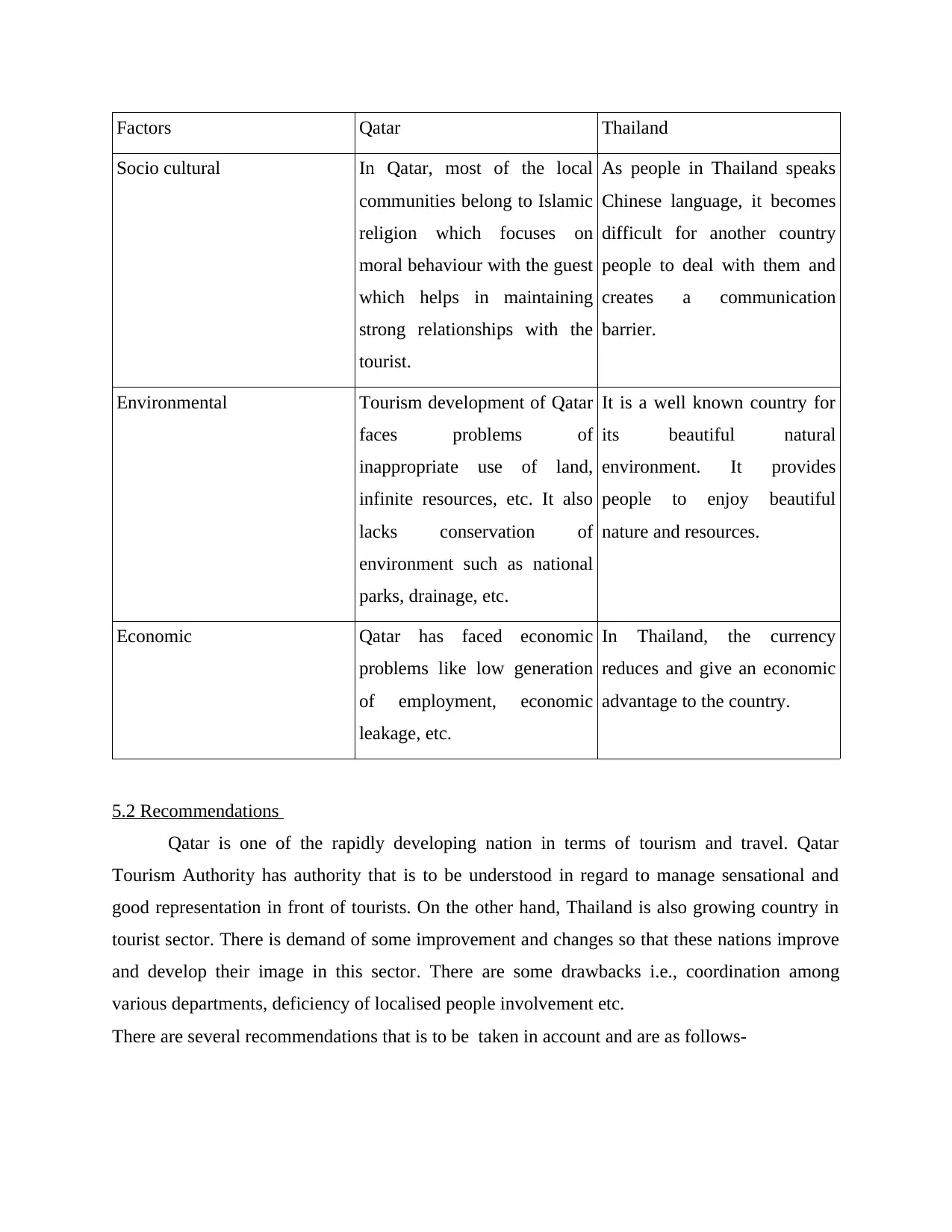
Factors Qatar Thailand
Socio cultural In Qatar, most of the local
communities belong to Islamic
religion which focuses on
moral behaviour with the guest
which helps in maintaining
strong relationships with the
tourist.
As people in Thailand speaks
Chinese language, it becomes
difficult for another country
people to deal with them and
creates a communication
barrier.
Environmental Tourism development of Qatar
faces problems of
inappropriate use of land,
infinite resources, etc. It also
lacks conservation of
environment such as national
parks, drainage, etc.
It is a well known country for
its beautiful natural
environment. It provides
people to enjoy beautiful
nature and resources.
Economic Qatar has faced economic
problems like low generation
of employment, economic
leakage, etc.
In Thailand, the currency
reduces and give an economic
advantage to the country.
5.2 Recommendations
Qatar is one of the rapidly developing nation in terms of tourism and travel. Qatar
Tourism Authority has authority that is to be understood in regard to manage sensational and
good representation in front of tourists. On the other hand, Thailand is also growing country in
tourist sector. There is demand of some improvement and changes so that these nations improve
and develop their image in this sector. There are some drawbacks i.e., coordination among
various departments, deficiency of localised people involvement etc.
There are several recommendations that is to be taken in account and are as follows-
Socio cultural In Qatar, most of the local
communities belong to Islamic
religion which focuses on
moral behaviour with the guest
which helps in maintaining
strong relationships with the
tourist.
As people in Thailand speaks
Chinese language, it becomes
difficult for another country
people to deal with them and
creates a communication
barrier.
Environmental Tourism development of Qatar
faces problems of
inappropriate use of land,
infinite resources, etc. It also
lacks conservation of
environment such as national
parks, drainage, etc.
It is a well known country for
its beautiful natural
environment. It provides
people to enjoy beautiful
nature and resources.
Economic Qatar has faced economic
problems like low generation
of employment, economic
leakage, etc.
In Thailand, the currency
reduces and give an economic
advantage to the country.
5.2 Recommendations
Qatar is one of the rapidly developing nation in terms of tourism and travel. Qatar
Tourism Authority has authority that is to be understood in regard to manage sensational and
good representation in front of tourists. On the other hand, Thailand is also growing country in
tourist sector. There is demand of some improvement and changes so that these nations improve
and develop their image in this sector. There are some drawbacks i.e., coordination among
various departments, deficiency of localised people involvement etc.
There are several recommendations that is to be taken in account and are as follows-
⊘ This is a preview!⊘
Do you want full access?
Subscribe today to unlock all pages.

Trusted by 1+ million students worldwide
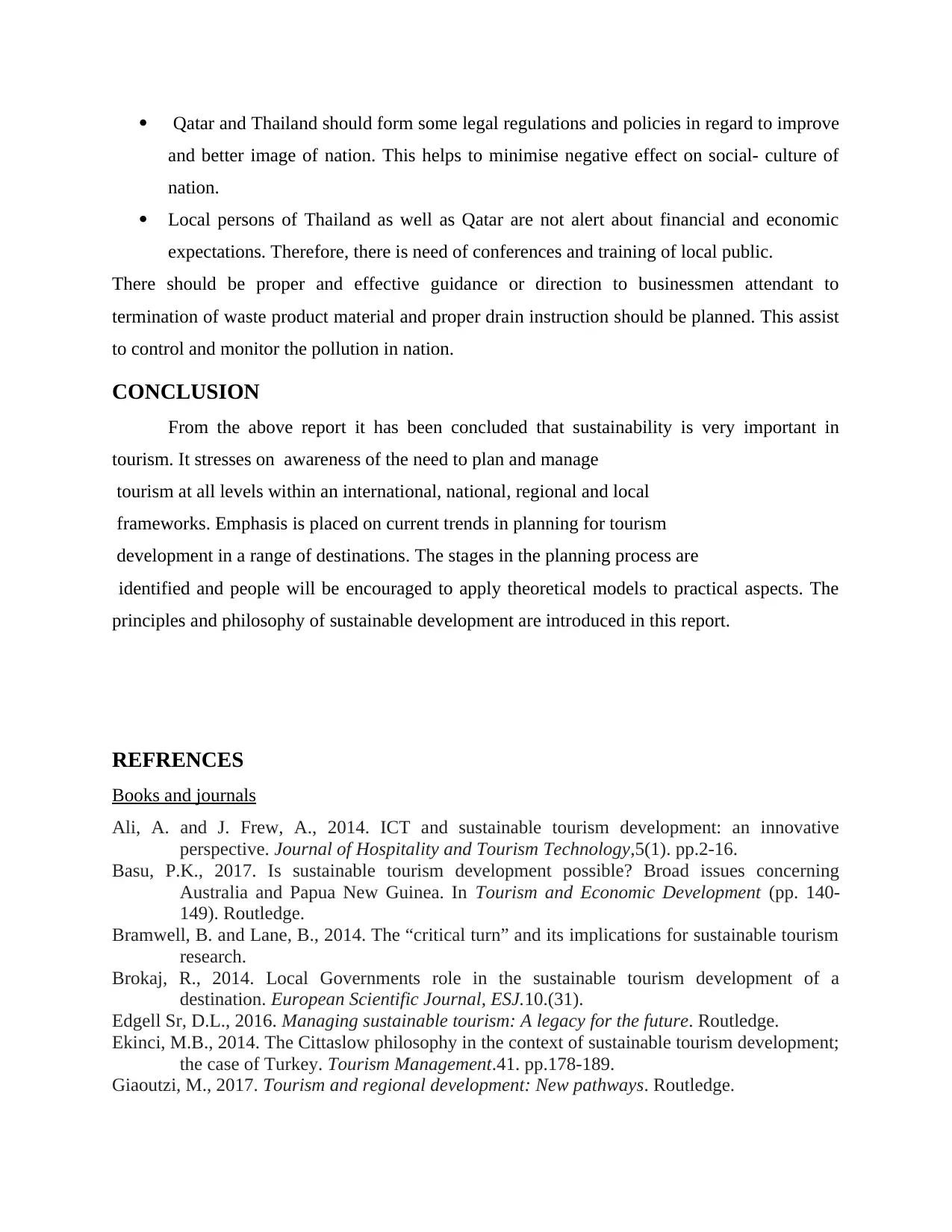
Qatar and Thailand should form some legal regulations and policies in regard to improve
and better image of nation. This helps to minimise negative effect on social- culture of
nation.
Local persons of Thailand as well as Qatar are not alert about financial and economic
expectations. Therefore, there is need of conferences and training of local public.
There should be proper and effective guidance or direction to businessmen attendant to
termination of waste product material and proper drain instruction should be planned. This assist
to control and monitor the pollution in nation.
CONCLUSION
From the above report it has been concluded that sustainability is very important in
tourism. It stresses on awareness of the need to plan and manage
tourism at all levels within an international, national, regional and local
frameworks. Emphasis is placed on current trends in planning for tourism
development in a range of destinations. The stages in the planning process are
identified and people will be encouraged to apply theoretical models to practical aspects. The
principles and philosophy of sustainable development are introduced in this report.
REFRENCES
Books and journals
Ali, A. and J. Frew, A., 2014. ICT and sustainable tourism development: an innovative
perspective. Journal of Hospitality and Tourism Technology,5(1). pp.2-16.
Basu, P.K., 2017. Is sustainable tourism development possible? Broad issues concerning
Australia and Papua New Guinea. In Tourism and Economic Development (pp. 140-
149). Routledge.
Bramwell, B. and Lane, B., 2014. The “critical turn” and its implications for sustainable tourism
research.
Brokaj, R., 2014. Local Governments role in the sustainable tourism development of a
destination. European Scientific Journal, ESJ.10.(31).
Edgell Sr, D.L., 2016. Managing sustainable tourism: A legacy for the future. Routledge.
Ekinci, M.B., 2014. The Cittaslow philosophy in the context of sustainable tourism development;
the case of Turkey. Tourism Management.41. pp.178-189.
Giaoutzi, M., 2017. Tourism and regional development: New pathways. Routledge.
and better image of nation. This helps to minimise negative effect on social- culture of
nation.
Local persons of Thailand as well as Qatar are not alert about financial and economic
expectations. Therefore, there is need of conferences and training of local public.
There should be proper and effective guidance or direction to businessmen attendant to
termination of waste product material and proper drain instruction should be planned. This assist
to control and monitor the pollution in nation.
CONCLUSION
From the above report it has been concluded that sustainability is very important in
tourism. It stresses on awareness of the need to plan and manage
tourism at all levels within an international, national, regional and local
frameworks. Emphasis is placed on current trends in planning for tourism
development in a range of destinations. The stages in the planning process are
identified and people will be encouraged to apply theoretical models to practical aspects. The
principles and philosophy of sustainable development are introduced in this report.
REFRENCES
Books and journals
Ali, A. and J. Frew, A., 2014. ICT and sustainable tourism development: an innovative
perspective. Journal of Hospitality and Tourism Technology,5(1). pp.2-16.
Basu, P.K., 2017. Is sustainable tourism development possible? Broad issues concerning
Australia and Papua New Guinea. In Tourism and Economic Development (pp. 140-
149). Routledge.
Bramwell, B. and Lane, B., 2014. The “critical turn” and its implications for sustainable tourism
research.
Brokaj, R., 2014. Local Governments role in the sustainable tourism development of a
destination. European Scientific Journal, ESJ.10.(31).
Edgell Sr, D.L., 2016. Managing sustainable tourism: A legacy for the future. Routledge.
Ekinci, M.B., 2014. The Cittaslow philosophy in the context of sustainable tourism development;
the case of Turkey. Tourism Management.41. pp.178-189.
Giaoutzi, M., 2017. Tourism and regional development: New pathways. Routledge.
Paraphrase This Document
Need a fresh take? Get an instant paraphrase of this document with our AI Paraphraser
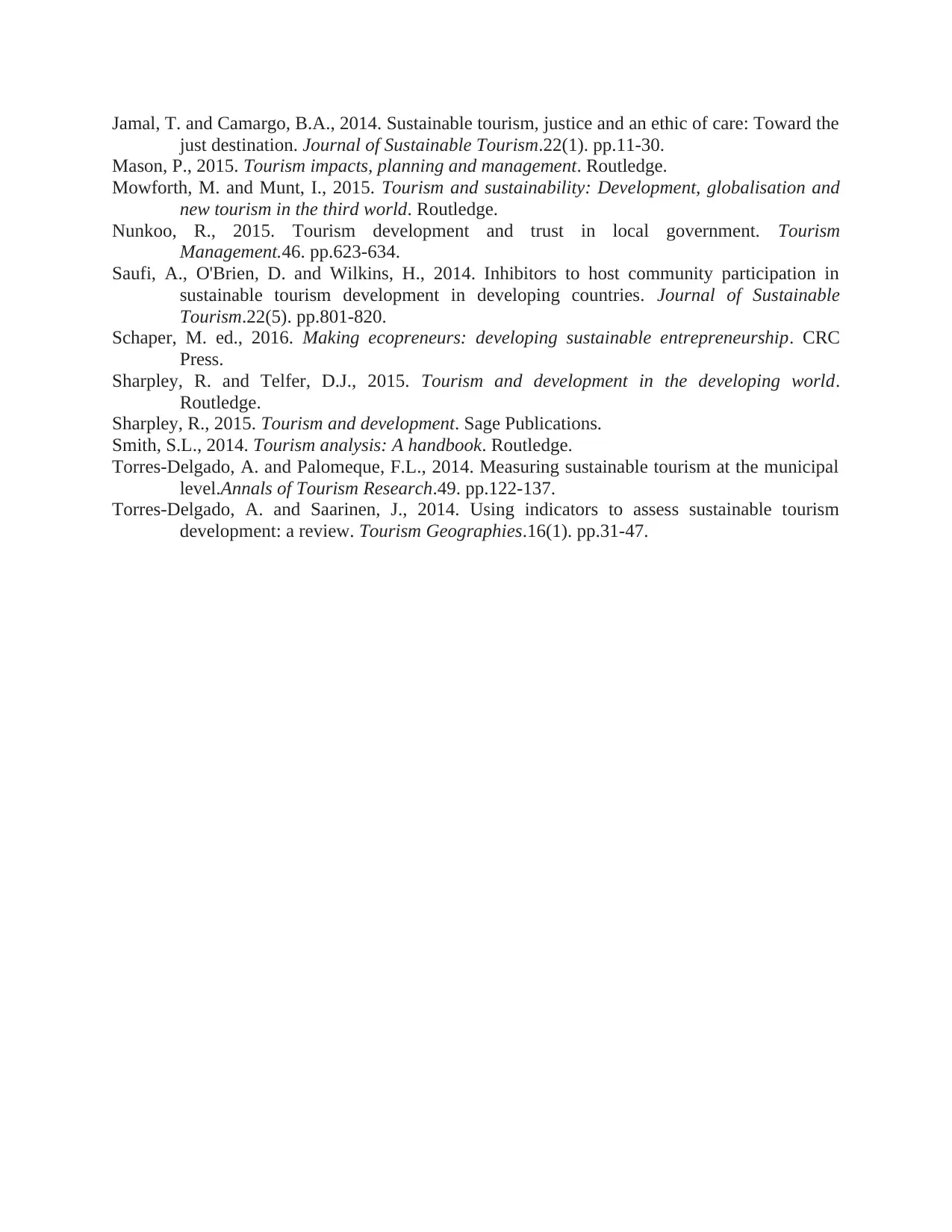
Jamal, T. and Camargo, B.A., 2014. Sustainable tourism, justice and an ethic of care: Toward the
just destination. Journal of Sustainable Tourism.22(1). pp.11-30.
Mason, P., 2015. Tourism impacts, planning and management. Routledge.
Mowforth, M. and Munt, I., 2015. Tourism and sustainability: Development, globalisation and
new tourism in the third world. Routledge.
Nunkoo, R., 2015. Tourism development and trust in local government. Tourism
Management.46. pp.623-634.
Saufi, A., O'Brien, D. and Wilkins, H., 2014. Inhibitors to host community participation in
sustainable tourism development in developing countries. Journal of Sustainable
Tourism.22(5). pp.801-820.
Schaper, M. ed., 2016. Making ecopreneurs: developing sustainable entrepreneurship. CRC
Press.
Sharpley, R. and Telfer, D.J., 2015. Tourism and development in the developing world.
Routledge.
Sharpley, R., 2015. Tourism and development. Sage Publications.
Smith, S.L., 2014. Tourism analysis: A handbook. Routledge.
Torres-Delgado, A. and Palomeque, F.L., 2014. Measuring sustainable tourism at the municipal
level.Annals of Tourism Research.49. pp.122-137.
Torres-Delgado, A. and Saarinen, J., 2014. Using indicators to assess sustainable tourism
development: a review. Tourism Geographies.16(1). pp.31-47.
just destination. Journal of Sustainable Tourism.22(1). pp.11-30.
Mason, P., 2015. Tourism impacts, planning and management. Routledge.
Mowforth, M. and Munt, I., 2015. Tourism and sustainability: Development, globalisation and
new tourism in the third world. Routledge.
Nunkoo, R., 2015. Tourism development and trust in local government. Tourism
Management.46. pp.623-634.
Saufi, A., O'Brien, D. and Wilkins, H., 2014. Inhibitors to host community participation in
sustainable tourism development in developing countries. Journal of Sustainable
Tourism.22(5). pp.801-820.
Schaper, M. ed., 2016. Making ecopreneurs: developing sustainable entrepreneurship. CRC
Press.
Sharpley, R. and Telfer, D.J., 2015. Tourism and development in the developing world.
Routledge.
Sharpley, R., 2015. Tourism and development. Sage Publications.
Smith, S.L., 2014. Tourism analysis: A handbook. Routledge.
Torres-Delgado, A. and Palomeque, F.L., 2014. Measuring sustainable tourism at the municipal
level.Annals of Tourism Research.49. pp.122-137.
Torres-Delgado, A. and Saarinen, J., 2014. Using indicators to assess sustainable tourism
development: a review. Tourism Geographies.16(1). pp.31-47.
1 out of 11
Related Documents
Your All-in-One AI-Powered Toolkit for Academic Success.
+13062052269
info@desklib.com
Available 24*7 on WhatsApp / Email
![[object Object]](/_next/static/media/star-bottom.7253800d.svg)
Unlock your academic potential
Copyright © 2020–2025 A2Z Services. All Rights Reserved. Developed and managed by ZUCOL.




